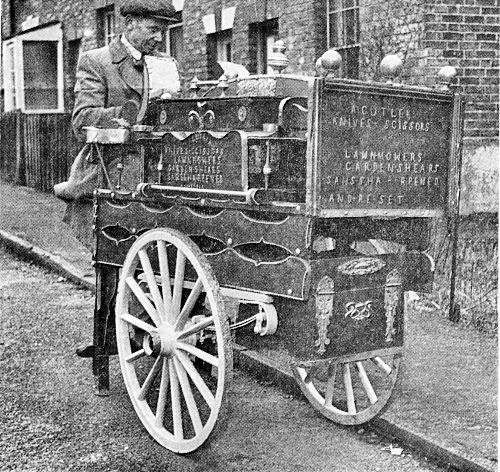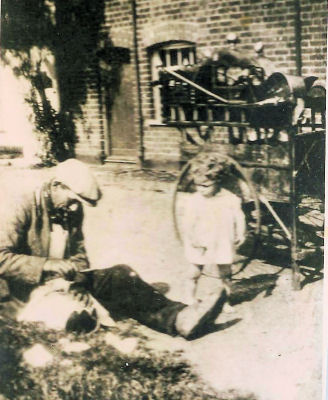|
Israel LOVERIDGE, Romany & Knife Grinder, after 1864 January, 2013 |
|
||||||
Tracey Waters (t.j.waters @t blueyonder.co.uk) writes from Chatham, Kent, to say: I was googling my great granddad's name and a link came up to your site with regards an article in Herts Countryside mag Summer 1964. The article was a childhood memory of a knife grinder. Next to it is the name Israel Loveridge. I wonder if this might be my great great grandad. He was a grinder/hawker born in 1869 in Ampthill [Beds] and died in 1940 in St Albans. My family were Romanies (I am not) who mostly travelled around Beds/Herts and Suffolk/Essex. Israel's daughter Lavinia (bn 1897) was my great gran. She eventually settled in Markyate which is where she is interred along with my gran and other members of my family. They are quite a difficult family to trace back and indeed forward so if this article is indeed about my 2 x g.g or his son Israel I would be very very pleased to see it.
|
The following two pictures were taken by Dennis Rookard, and reproduced in the Hertfordshire Countryside for Summer 1964 |
||
 |
This knife-grinder is Israel Loveridge and he was photographed when he visited Brentwood as part of his winter tour in Essex. Mr. Loveridge told the photographer that he made his home in Saffron Walden and travelled only in the winter. In the summer he worked on a farm. |
|
|
Israel Loveridge, the knife-grinder, was born in a tent by the side of a road over fifty-seven years ago. He says that the barrow is now 141 years old, having been built in 1823. |
.jpg) |
||||
|
|||||
|
A quick check of the 1901 and 1911 census returns (excuse any spelling problems) confirmed that the family of Israel and Eliza Loveridge moved around with the eldest, Joseph, being born in 1890 at Nasty, in Munden, (yes, there really is a place called "Nasty" in Hertfordshire); Zigher ?at Bilstone, Suffolk; Charles at Bilstone or Presenfield, Suffolk; Lavinia at Streadbrook, Suffolk; Elias at Toddington, Beds; Rosina at Newfundcole, Essex; Fanny at Stotfold, Beds; Israel [the one pictured above] at Toddington, Beds; Bethamy, at Tring, Herts; and Matilda at Stotfold, Beds.
|
|||||
|
I don't know if it is directly relevant but one of the Romany and Traveller Family History Society publications is entitled The Family Tree of William and Margaret Loveridge. |
|||||
|
The pictures were with an article, My childhood memories of Brummy - The Knife-Grinder, by Elizabeth E. Chivery - which described a different knife-grinder, known only as "Brummy" who clearly plied his trade in the St Albans area perhaps 40 or 50 years earlier. |
|||||
|
Old Brummy, the knife-grinder, used to come to our village [Sandridge], just outside St. Albans, about three times a year. We would see him pushing his barrow up the path to the house and immediately rush to meet him. What ever the weather, he always met us with a beaming smile, his twinkling eyes almost disappearing in his weather beaten face. " Here I am again, my dears" was his regular greeting. "I expect your mother is wanting me." Eagerly we helped him push his barrow into position in the yard, and after the knives, scissors and shears were brought out we gathered round him to watch and listen. Brummy never altered in appearance. Winter or summer he wore two waistcoats, a cloth one and a thick grey knitted one. Over them he had a long brown jacket reaching almost to his knees, with enormous pockets in it. These pockets were stuffed so full they seemed to weigh him down, and the contents were almost as exciting as their owner. There was an engraved silver box, worn thin and shiny, in which he kept his strong black shag, given to him by an Indian rajah, according to Brummy. Then there were a huge old "turnip" watch, a book or two, a compass and a " penny" whistle on which he would sometimes play us a gay little tune. In addition he always had some small wild animal. It might be a hedgehog or a mole, and once it was a squirrel that Brummy had tamed. He would take it out and talk to it and play with it for a little while before putting it back into his pocket. *** We never saw Brummy without his old clay pipe in his mouth. It was very discoloured and the stem was not much more than an inch long. It hung precariously from the corner of his mouth, apparently in imminent danger of falling out, and just as we were certain it was going to drop Brummy drew in his lips and saved it. Once he was settled on his barrow, his feet working the pedals and the knives grinding away busily, we pleaded, "Brummy, tell us about the boxing, please." Then Brummy, his clay pipe still in his mouth, told us how as a young man he fought bare-fisted in the cellar of a public-house for the entertainment of the" gentry." They were long and frequently bloody fights, and ended only when one or other of the fighters could go on no more. Bets were laid by the "gentry," and men who had won large sums would usually make generous gifts to the winner. *** Brurnmy was a born story-teller, and no matter how many times he told it we listened enthralled to the story of his epic fight with his greatest rival, "Big Len Reynolds." To us it was akin to " Jack the Giant Killer," and we suffered with Brummy through those twenty-seven long rounds. We cheered his great victory and thought that the gentleman who gave him ten golden sovereigns did no more than our hero deserved. *** Sometimes we asked Brummy for the Indian stories. He had been some sort of servant to an English family out there and had an endless store of adventures to recount. It was after a tiger hunt which he attended with his master (who had been invited by the rajah) that Brummy was given the tobacco box. We lived with Brummy through these tense days of stalking the tiger, endured with him the everlasting heat and rejoiced at last when the animal was captured. Brummy always remained a slightly mysterious figure. When we asked him his real name his reply was "Just call me Brummy." To our questions of where he lived his answer was always "Here and there, my dears, here and there." We knew that at ten years old he was earning money working in the fields and that he had spent some years boxing, and then there were the years he had lived in India; but how much was true and how much fantasy was some thing we did not question. To us (and I think to Brummy) it had all really happened. There was one rather odd incident. One of his visits coincided with the annual call of the Breton onion-seller. Within a few minutes Brummy and the onion-seller were having a long and animated conversation, with much laughter and back slapping - and all in French! When the onion-seller had gone, we cried out: " You said that you left school at ten; where did you learn French?" Brummy gave his warm grin and said" Here and there, my dears, here and there." *** The old knife grinder remained a mystery to the end. His last visit was on a late autumn day, and as he put his tools away and we accompanied him down the path he said " See you in the spring, my dears." The spring came and the summer, but we never saw Brummy again. We inquired for him in the village, but no one knew where he came from or what had happened to him. We looked for him every time we went into St. Albans on market days and badgered everyone for information, but all to no avail. I still have a knife, its blade almost paper thin, a relic of the Brummy days. Whenever I use it I see him sitting on his barrow, his old clay pipe warming his nose, his little eyes twinkling, telling his stories to a group of wide-eyed children. |
|||||



